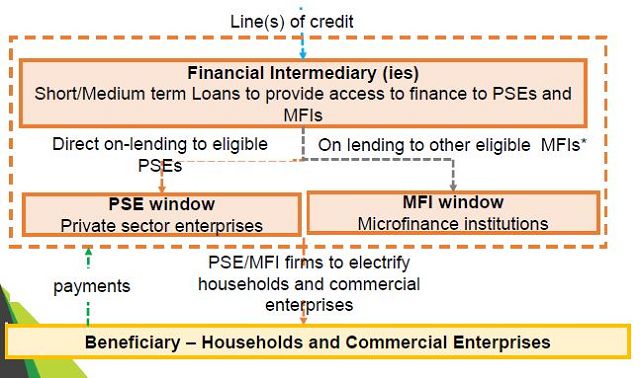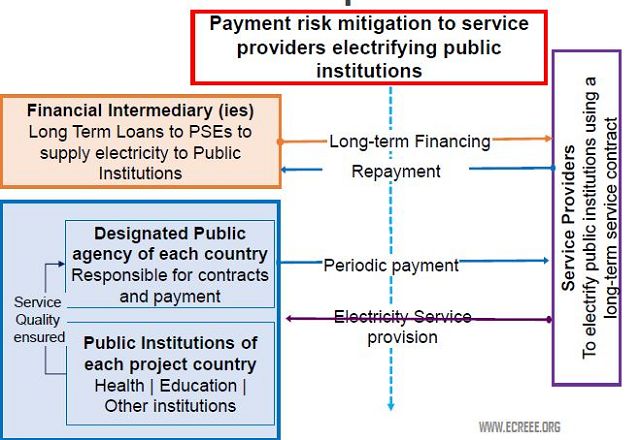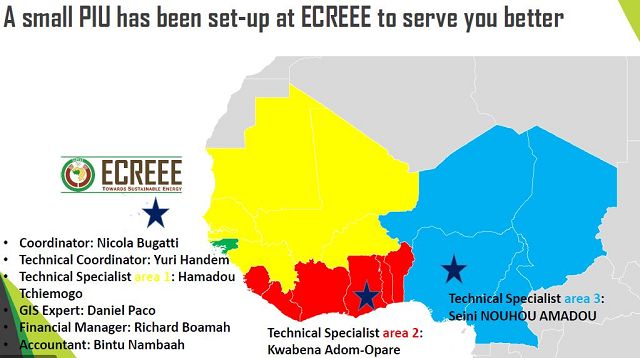Overview
The World Bank and ECREEE have designed the Regional Off-Grid Electrification Project (ROGEP) to increase access to sustainable electricity services in the ECOWAS region and 4 Sahel countries for household, commercial enterprises and public facilities.
Up to 174.5 million ECOWAS citizens had no access to electricity in 2016; 77 percent of them live in rural areas. Energy is of strategic importance in achieving sustainable development and poverty reduction.
This project targets 15 ECOWAS countries and 4 Sahel countries to focus on mobilizing private investment with a market based approach. The regional approach allows experiences exchange, harmonization of an attractive and sizeable market, and supporting relatively small countries to benefit too. The project aims to seek synergies with already on-going initiatives. The use of the different instruments of ROGEP by the countries will depend on the interest, enabling environment and market situation in each of them.
|
Implementer |
ECREE |
|
Donors and budget |
World Bank Group, 200 million USD |
|
Start and end date |
April 2017 to July 2022 |
|
Aims/objectives |
support the efforts of West Africa and Sahel countries to accelerate the deployment of pico-PV (<10W), SHS and standalone PV systems for rural public services and productive uses |
|
Geographic coverage |
19 countries: Senegal, the Gambia, Mauritania, Guinee, Mali, Burkina Faso; Sierra Leone, Liberia, Cote D’Ivoire, Ghana, Togo, Benin; Niger, Nigeria, Chad, Central Africa Republic, Cameroon; Cabo Verde, Guinea Bissau. |
|
Target groups |
Female and male entrepreneurs, financial institutions, public institutions, |
Components
Component 1:Technical Assistance to improve off grid market ecosystem for female and male entrepreneurs
These Technical Assistance activities are to improve conditions for investment and attract local and international companies to the business in a harmonized regional market. This includes to a gender - responsive ecosystem for electrification activities and regional market harmonization i.e. Technical standards, trade conditions and import duties.
Activities within this component will precede the other activities in the project and will be provided to all the project countries in parallel. Technical assistance (TA) activities include
- regulatory support ,
- private sector support facility that will support the start - up and growth of entrepreneurial solar firms
- market assessment studies, identification of barriers towards a regional harmonized market of solar products,
- development of private sector facilities,
- seed funding support to start - ups with good potential,
- attracting impact investors through matching grant schemes,
- developing a guarantee fund to mitigate the risk exposure of commercial banks to lend in new companies in the solar space and to mitigate the payment risk exposure from public institutions to the private service providers.
Component 2: Electrification of Households and Commercial Enterprises

The credit lines will provide working capital and receivables financing to project developers (private sector enterprises - PSEs, small and 3 medium enterprises (SMEs) and productive end - users of solar power.) This facility will address key financing challenges such as lack of liquidity in the financial sector, lack of funding in local currency and foreign exchange, and limited capacity to provide collateral.
Furthermore, to ensure th at the project promotes women’s entrepreneurship development, where feasible, credit will be provided to women - led energy enterprises or energy businesses that have specific goals of improving women’s income generation capacity through energy access.
Component 3: Support service providers to electrify Public Institutions.

Activities, Updates, Results
November 2017
A national workshop about ROGEP was held with various stakeholders. Various stakeholders learned about ROGEP and discussed the current situation in Liberia and ways forward for renewable off-grid solutions in Liberia. Opportunities and challenges were shared between representatives from financial institutions and renewable energy businesses and consultants, as well as government agencies and donor representatives
Read more:
Regional Off-Grid Electrification Project (ECREEE) holds National Workshop (Renewables Liberia)
Liberia to Benefit From Regional Off-grid Electrification Project (Frontpage)
June 2018
GreenMax Capital Advisors from USA are tasked to organize assessments in different countries. For Liberia, they contracted Nathan Reeves as consultant who facilitated various focus groups, consulting stakeholders to inform about current situation and ideas for improvement of off-grid solar systems in public institutions, private households, for productive use and agriculture.

